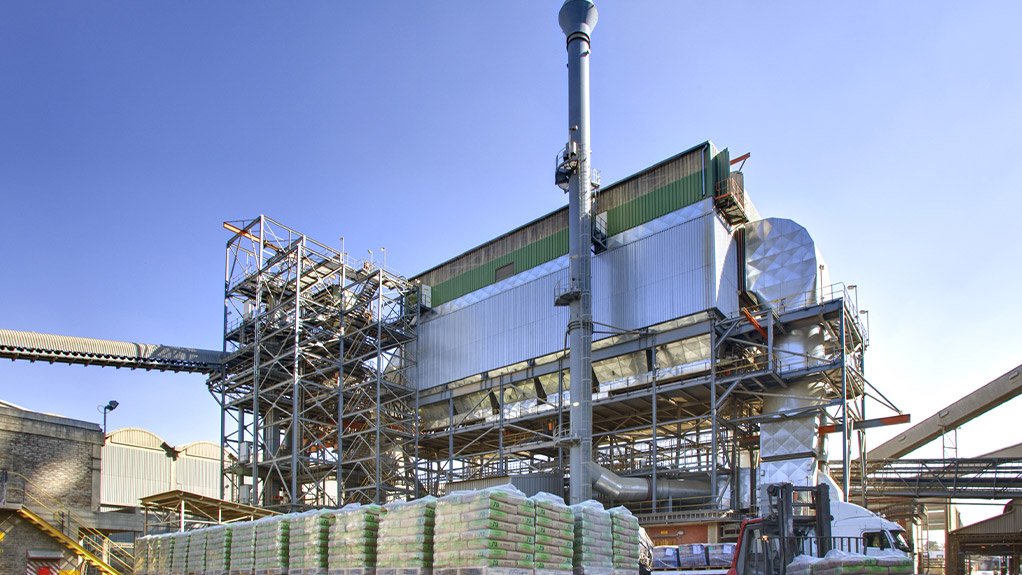Prioritise responsible manufacture, urges cement leader


All South African businesses are under pressure to reduce their carbon emissions
This article has been supplied as a media statement and is not written by Creamer Media. It may be available only for a limited time on this website.
As South Africa endures some of its most difficult economic times yet, the country should recognise the importance of supporting responsible manufacturing practice in its cement sector.
The call comes from Hannes Meyer, cementitious executive at leading cement producer AfriSam, who emphasises the strategic value – both economic and social – in a sector that generates this vital commodity.
“As the backbone of our national infrastructure, cement is also a product that represents our highest aspirations of mineral beneficiation,” says Meyer. “To produce this valuable resource, we must start with mining our own deposits. We then process the ingredients through complex technologies that demand considerable financial investment and expertise.”
The range of products that result must form part of an intricate supply chain before arriving where it must be used, he says. Almost the entire value chain, however, is local – creating market demand and local job opportunities all along the way.
“In addition to the basic requirements of the cement business, South Africa’s cement producers are also mineral rights holders who must comply with mining regulations, which includes Social and Labour Plans,” he says. “In addition to normal business legislation, we must go the extra mile to promote development in and around the communities where we operate.”
He points out that this is currently more difficult for cement producers than for miners of more high-value commodities, who are currently benefiting from buoyant prices set by global markets. In contrast, cement prices are determined by demand in the country’s building and construction sectors, where performance remains lacklustre.
“Despite the challenges, local cement producers like AfriSam continue to meet compliance requirements, as these align with our underlying corporate commitment to the future of Africa and the planet,” says Meyer.
Added to the industry’s responsibilities, he notes, is the growing pressure on all South African businesses to reduce carbon emissions in the interests of a low-carbon future that responds to the growing dangers of climate change. As an energy-intensive sector, cement production is researching and applying various innovations to reduce its carbon footprint. The government’s recent carbon tax – which is payable by local producers – has created a further imbalance in the market that disadvantages local players, he pointed out.
“With the wholesale import of cement from countries unencumbered by a carbon tax, there is no level playing field for responsible local manufacturers who are often undercut by imports not governed by our rules,” he says.
The danger of further weakening the South African base of responsible manufacturers, he says, is that the country will need to rely mainly on its own internal capacity if it wants to generate inclusive and sustainable economic growth into the future. With government hoping to raise infrastructure expenditure, there must be strong local construction expertise and products to implement these projects.
“An important part of local cement producers’ contribution is the skills and technology development that we continue to generate for the South African economy,” says Meyer. “We develop skills in local communities, and opportunities for small black-owned businesses, as well as for women and youth in our supply chain. This is a core pillar of responsible manufacturing that the country should support and reward.”
Comments
Press Office
Announcements
What's On
Subscribe to improve your user experience...
Option 1 (equivalent of R125 a month):
Receive a weekly copy of Creamer Media's Engineering News & Mining Weekly magazine
(print copy for those in South Africa and e-magazine for those outside of South Africa)
Receive daily email newsletters
Access to full search results
Access archive of magazine back copies
Access to Projects in Progress
Access to ONE Research Report of your choice in PDF format
Option 2 (equivalent of R375 a month):
All benefits from Option 1
PLUS
Access to Creamer Media's Research Channel Africa for ALL Research Reports, in PDF format, on various industrial and mining sectors
including Electricity; Water; Energy Transition; Hydrogen; Roads, Rail and Ports; Coal; Gold; Platinum; Battery Metals; etc.
Already a subscriber?
Forgotten your password?
Receive weekly copy of Creamer Media's Engineering News & Mining Weekly magazine (print copy for those in South Africa and e-magazine for those outside of South Africa)
➕
Recieve daily email newsletters
➕
Access to full search results
➕
Access archive of magazine back copies
➕
Access to Projects in Progress
➕
Access to ONE Research Report of your choice in PDF format
RESEARCH CHANNEL AFRICA
R4500 (equivalent of R375 a month)
SUBSCRIBEAll benefits from Option 1
➕
Access to Creamer Media's Research Channel Africa for ALL Research Reports on various industrial and mining sectors, in PDF format, including on:
Electricity
➕
Water
➕
Energy Transition
➕
Hydrogen
➕
Roads, Rail and Ports
➕
Coal
➕
Gold
➕
Platinum
➕
Battery Metals
➕
etc.
Receive all benefits from Option 1 or Option 2 delivered to numerous people at your company
➕
Multiple User names and Passwords for simultaneous log-ins
➕
Intranet integration access to all in your organisation

















